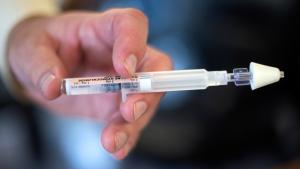Kansas lawmakers will push for a medical marijuana bill when the session begins in January, Connecticut's dispensaries will be able to sell to any adult beginning in January, and more.

Connecticut Recreational Marijuana Sales Set to Begin January 10. The state Department of Consumer Protection, which regulates marijuana in the state, has announced that the state's seven existing medical marijuana dispensaries had "successfully completed the necessary steps for conversion to a hybrid license," allowing them to also sell to the adult recreational market beginning January 10. Sales will be limited to a "a total of ¼ ounce of cannabis flower or its equivalent per transaction," according to the DCP. The move comes more than a year and a half after Gov. Ned Lamont (D) signed a marijuana legalization bill into law.
Medical Marijuana
Kansas Lawmakers Plan to Introduce Medical Marijuana Bill at Start of Session Next Month. Since the end of the last legislative session, members of the Special Committee on Medical Marijuana have been meeting, compiling data, and evaluating research, and now they say they are ready to file a medical marijuana bill at the beginning of the session beginning next month. "I think what I’m going to do is — and any member is more than welcome — is to take this information and create the bill," said. Sen. Rob Olson (R-Olathe), chair of the medical marijuana committee. "And I’m going to work on a bill with a couple members and then if anybody wants to sign on in the Senate, they’ll be more than able to sign onto that bill and introduce it at the beginning of session." He also called on House lawmakers to file similar legislation. "I think that’s probably the best way forward," Olson said. Kansas is one of the 13 states that have still not legalized medical marijuana.
Foreign Policy
White House Formally Continues Drug Trafficking State of National Emergency. The White House on Monday issued an executive order continuing a state of national emergency "to deal with the unusual and extraordinary threat to the national security, foreign policy, and economy of the United States constituted by global illicit drug trafficking." Noting that drug overdoses are killing tens of thousands of Americans each year, the order warns that: "Drug cartels, transnational criminal organizations, and their facilitators are the primary sources of illicit drugs and precursor chemicals that fuel the current opioid epidemic, as well as drug-related violence that harms our communities. International drug trafficking — including the illicit production, global sale, and widespread distribution of illegal drugs; the rise of extremely potent drugs such as fentanyl and other synthetic opioids; as well as the growing role of Internet-based drug sales — continues to pose an unusual and extraordinary threat to the national security, foreign policy, and economy of the United States. For this reason, the national emergency declared in Executive Order 14059 of December 15, 2021, must continue in effect beyond December 15, 2022. Therefore, in accordance with section 202(d) of the National Emergencies Act (50 U.S.C. 1622(d)), I am continuing for 1 year the national emergency declared in Executive Order 14059 with respect to global illicit drug trafficking."
Harm Reduction
Major Drug Maker Applies to Sell Over-the-Counter Naloxone. In a move that addiction experts say could save tens of thousands of lives, a major drug maker has applied to sell the opioid overdose reversal drug naloxone over-the-counter. Emergent BioSolutions is now seeking permission to sell the drug without a prescription and says the Food and Drug Administration (FDA) has agreed to fast-track its review. A decision is expected by the end of March. Drug policy experts agreed that making naloxone more widely available is an important step in reducing drug overdoses but raised one concern: price. If OTC naloxone is too expensive, many people using drugs on the street just won't buy it, said University of North Carolina drug researcher Nabarun Dasgupta. "If we have this resource scarcity mentality that this is an expensive product, this is a special product, then people will not take enough kits to do what they need to do."
This work by StoptheDrugWar.org is licensed under Creative Commons Attribution-ShareAlike 4.0 International
Add new comment